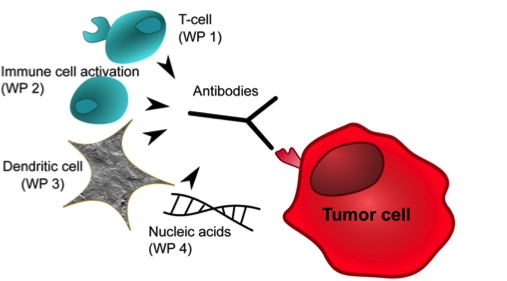Research projects
As a result of expanding efforts to improve cancer therapy, a main paradigm change has occurred by targeting the immune system, not the tumor itself. „Science“ highlighted immunotherapy of cancer as „breakthrough of the year 2013“. Antibody-based therapies form an integral and constantly growing part of this approach leading towards individualised medicine. These therapies will strongly influence the coming decade of cancer care.
The training network for the immunotherapy of cancer (IMMUTRAIN), received 3,6 Mio.€ for four years from the European Union in order to perform cutting-edge research in this field and to respond to the increasing demand for well-trained and skilled researchers. The network is coordinated by Prof. Dr. Stefan Endres and PD Dr. Sebastian Kobold from the Division of Clinical Pharmacology at the Ludwig-Maximilians-Universität München. IMMUTRAIN will bring together experts of nine European countries in the fields of monoclonal antibodies, dendritic cells, T-cells and immunomodulatory nucleic acids. The network also offers a considerable industrial involvement to train the next generation of scientists from different perspectives and give insights in different research environments.
Create synergies between immunotherapeutics approaches
IMMUTRAIN offers a scientific training to Early Stage Researchers with cutting-edge research projects, which are part of the scientific work packages and which will contribute to the progress of research for immunotherapy of cancer.
The overall goal of IMMUTRAIN is to enhance the efficacy of antibody-based therapies through combination with synergistic immunotherapeutic approaches.
Substantial numbers of the breakthroughs in cancer care during the last years have been achieved through antibodies. However, these achievements are dampened by the overall poor prognosis of most cancers and by the lack of efficacy of current antibody treatments in a large proportion of patients. Novel strategies improving antibody efficacy need to be explored.
Resistances to classical antibody therapies arise from local effector suppression, from loss of antigen or from downstream mutations of the targeted signaling pathways. To avoid or bypass these resistance mechanisms the IMMUTRAIN investigators will develop new strategies that exploit three exquisite characteristics of antibodies:
a) their tumor penetrating capacity,
b) their ability to recruit and engage immune cells either by binding with their Fc-terminus or with their variable binding site
c) their capacity to carry compounds.
These antibodies will then be combined with alternative immunstimulatory agents to ultimately increase antitumor efficacy by enhancing specificity and decreasing secondary toxicities. To this end, the work packages of IMMUTRAIN address the four most promising strategies to enhance clinical efficacy of antibodies:
- Work package 1, „Combination of antibodies with adoptive T cell transfer“, will target tumor-specific T cells to increase their infiltration into the tumor,
- Work package 2, „New formulations and combinations of antibodies to activate immune cells“, will restore immune activating mechanisms,
- Work package 3, „Combination of antibodies with dendritic cell therapy“, will unleash dendritic cell-induced immune responses,
- Work package 4, „Target discovery and validation for antibody combination therapies“, will specifically deliver immunostimulatory nucleic acids.

Figure: Overview over the work package topics
Background and objectives of the work packages
- Work package 1: Combination of antibodies with adoptive T cell transfer
Anti-tumor antibodies can recruit and activate T cells. However, this therapeutic mechanism has two major limitations. First, it lacks tumor specificity when the respective antigen is also expressed on normal tissue; secondly, it does not increase T cell infiltration into solid tumors (which is crucial for T cell efficiency). This work package will aim at increasing T cell infiltration into the tumor by using novel poly-specific antibodies against tumor-associated antigens and genetic T cell modification.
- Work package 2: New formulations and combinations of antibodies to activate immune cells
A prominent tumor escape mechanism is the local inhibition of an adequate immune response through up- or down-regulation of inhibitory or stimulatory signal molecules, respectively. Such a signaling takes place through receptor–ligand binding on the cell surface and thereby represents an exquisite target for antibody-based strategies to restore stimulation or to suppress inhibition. Work package 2 will aim at restoring immune activating signals in a tumor-specific manner through bispecific molecules.
- Work package 3: Combination of antibodies with dendritic cell therapy
Dendritic cells (DC) exhibit an unparalleled capacity to induce immunity. Proof-of-principle studies have shown that DC vaccines generated ex vivo can induce tumor-specific immune responses resulting in tumor eradication. However, long-lasting objective tumor responses are limited. Work package 3 will investigate how current DC-based vaccine strategies can be improved and be combined with antibodies either as carriers of antigen or as immune modulators.
- Work package 4: Target discovery and validation for antibody combination therapies
WP4 will focus on the identification of drivers of immune tolerance in aggressive cancers, and on the development of novel therapeutic strategies to ultimately control and eliminate metastatic cells. Main emphasis will be dedicated to the crosstalk of tumor cells and immune cells (including, but not limited to dendritic cells, macrophages, effector and regulatory T cells and NK cells, among others). Moreover, the different partners will be investigate the synergistic power of immunostimulatory nucleic acids with monoclonal antibodies to enhance antitumor efficacy and specificity in vivo.
